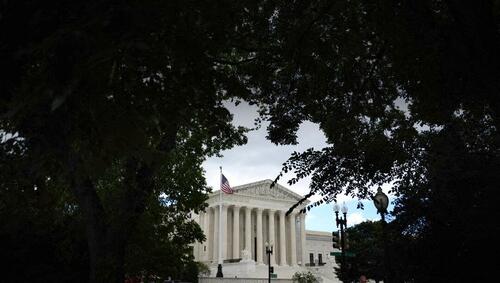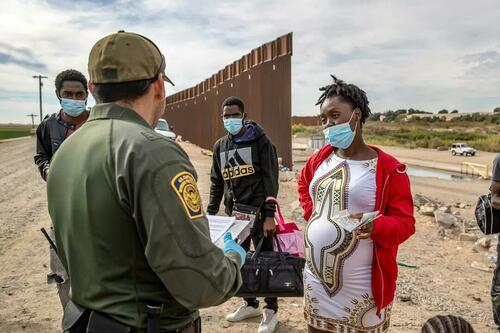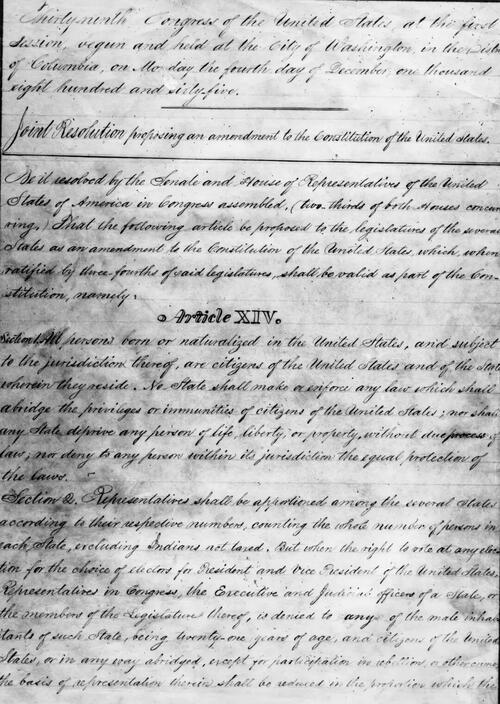Authored by Sam Dorman via The Epoch Times (emphasis ours),
Among President-elect Donald Trump’s plans for immigration is a move to end a longstanding practice of granting something known as “birthright citizenship” to children whose parents are illegally present in the United States.

Last year, he vowed to sign an executive order directing agencies to abandon that practice, if reelected.
How exactly Trump will change policies within agencies is unclear, but experts indicate he has options.
Regardless, revoking birthright citizenship could impact waves of new illegal immigrants and change the incentives for so-called birth tourism, wherein an expectant mother arrives in the United States just before giving birth.
During his first term, Trump attempted to combat the phenomenon through a policy targeting the country’s temporary visa program.
However Trump chooses to end birthright citizenship will likely provoke a legal battle of constitutional proportions and with a case that could reach the Supreme Court, as Trump predicted during his first term.
The concept of birthright citizenship stems from the 14th Amendment, which states in part: “All persons born or naturalized in the United States, and subject to the jurisdiction thereof, are citizens of the United States and of the state wherein they reside.”
Lora Ries, who serves as director of the Border Security and Immigration Center at the Heritage Foundation, told The Epoch Times that Trump could start by directing the State Department and Department of Homeland Security (DHS) to interpret the 14th Amendment in a particular way.
“I don’t believe that a statute is necessary” or that a “constitutional amendment is necessary,” said Ries, who also served as the deputy chief of staff for DHS during Trump’s first administration.

Sen. Lindsey Graham (R-S.C.) has introduced legislation that would end birthright citizenship for children of illegal immigrants.
Immigration Reform Law Institute director of litigation Chris Hajec indicated, however, that a Supreme Court decision will be necessary to effect long-term change.
“A law from Congress wouldn’t be enough,” he told The Epoch Times, noting that Trump’s executive policies and any act of Congress would likely end in the courts.
It’s unclear how many individuals will seek validation of birthright citizenship in the future but the Pew Research Center estimated in 2016 that around 4 million children in the United States had illegal immigrant parents.
The Federation for American Immigration Reform, which seeks to “reduce the negative impact of uncontrolled immigration,” said last year that taxpayers annually spend “approximately $182 billion to cover the costs incurred from the presence of more than 15.5 million illegal aliens and about 5.4 million citizen children of illegal aliens.”
While Hajec expects a Supreme Court decision on the issue, he doubts the court would somehow retroactively revoke birthright citizenship for individuals who already have it.
“I think the court would just say whether this prospective, forward-looking regulation of the Trump administration was lawful,” he said.
The court could allow Trump’s birthright citizenship policy by dismissing a challenge that arises from a lower court’s approval of it.
It could also agree to take up the lower court’s decision, likely prompting a re-examination of a longstanding precedent from the 19th century.
In United States v. Wong Kim Ark, a majority of the court held that the 14th Amendment granted birthright citizenship to a Chinese man whose parents were legally present in the United States.
Some have questioned whether the reasoning in that decision applies to children of the illegal immigrants who have crossed the southern border.
“The court only held that a child born of lawful, permanent residents was a U.S. citizen,” former Federal Election Commission member Hans von Spakovsky said in 2018.

“That is a far cry from saying that a child born of individuals who are here illegally must be considered a U.S. citizen.”
Many other groups disagreed, including the American Civil Liberties Union (ACLU), which has vowed to combat Trump’s agenda.
The organization said earlier this year: “Theories that attempt to carve children out of this guarantee [of citizenship] based on the immigration status of their parents are legally wrong, morally repugnant, and dangerous attacks on a core civil right.”
The finer points of interpreting that decision could be determined by whoever sits on the Supreme Court when Trump’s policy lands there.
Read the rest here...